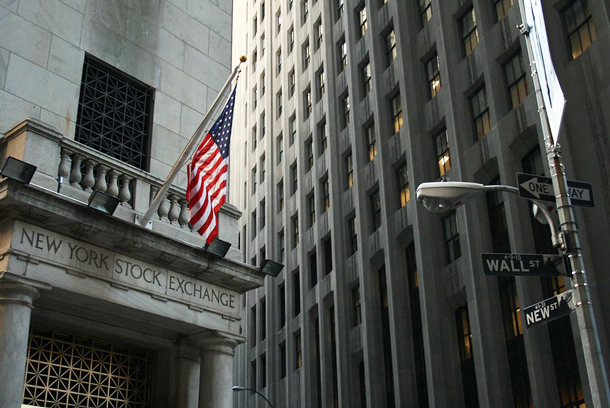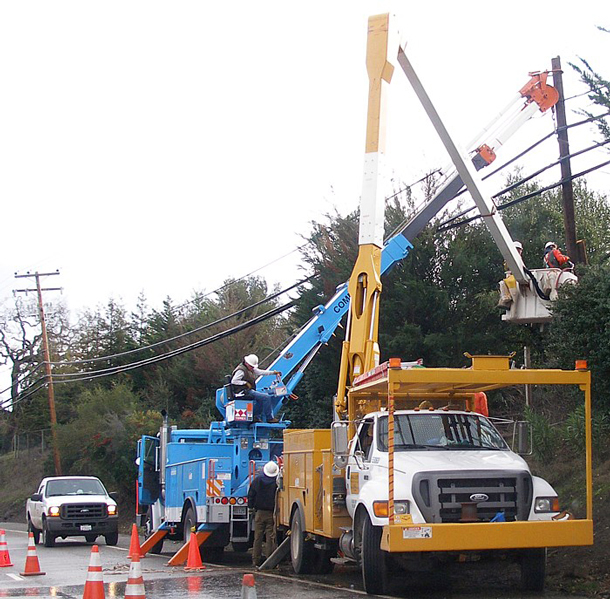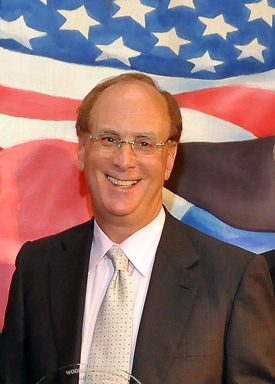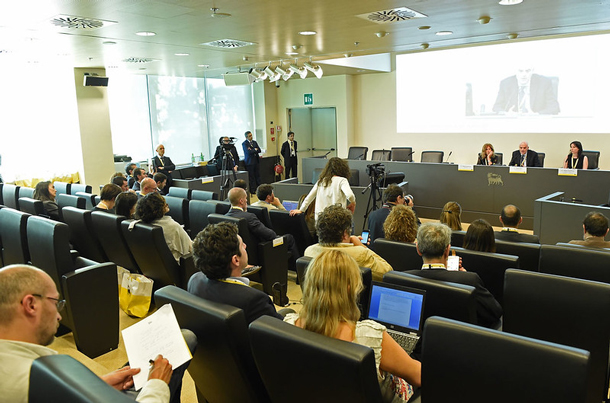Investors Eye Climate Risk
Air Date: Week of February 28, 2020

BlackRock CEO Larry Fink warns that climate change poses an even greater risk than the 2008 financial crisis. (Photo: BrainMaY, Flickr CC BY-SA 2.0)
BlackRock, with $7 trillion under management, is warning investors that climate change poses a major risk to portfolios and the economy. Mindy Lubber, CEO of sustainable investment group Ceres, discusses with Host Steve Curwood the BlackRock statement and why climate risk should be disclosed and mitigated just like any other risk.
Transcript
CURWOOD: Climate change is already costing billions if not trillions of dollars around the world as cities flood and landscapes burn. And some in the investment community are warning that portfolios are at risk from climate disruption. Already JP Morgan Chase has decided it’s too risky for them to do business with coal companies or finance drilling in the Arctic. And asset manager giant BlackRock has declared climate change presents a greater risk to global finance than the 2007 recession. Black Rock has $7 trillion under management and its CEO Larry Fink is calling for a “fair and just” transition to a more sustainable economy. We’re joined now by Mindy Lubber, CEO and President of Ceres, an alliance of investors, corporations and activists. Mindy, welcome back to Living on Earth!
LUBBER: Great to be back. Good to see you.
CURWOOD: How will this move by BlackRock to put sustainability at the core of its investment practices shift the kinds of investment decisions it makes?
LUBBER: Well, they put out some goals, let's watch to make sure those goals are acted on. But as you know, Steve, over the last decade or so we've taken the issue, and "we" being much larger than Ceres, of climate risk of just being an environmental problem, to the economic problem that it is. Not only is the science telling us it really will change the life of the next generation in our kids, but it will also radically change the economy. Climate change has a negative impact on every sector of our economy. And we want to see climate risk being considered, just like any other risk when you're a company making decisions, or when you're an investor making decisions. So having Larry Fink Larry, and Fink runs BlackRock, it's an investment firm that manages $6.8 trillion in assets under management, and for any of us, $6.8 trillion is a lot of zeros. And when he says climate risk or climate change impacts his portfolio, and that they're going to start taking heavily coal-oriented companies out of their portfolio, and they're going to start evaluating companies in their portfolio based on their how they're managing climate change, that's good. That's a good addition to the fact that we already have 350 investors, $35 trillion in assets under management, working with us on climate change.

PG&E declared bankruptcy in 2019 as it faced some $30 billion in liabilities for damage from wildfires its aging equipment allegedly sparked in 2017 and 2018. (Photo: Coolcaesar, Wikimedia Commons CC BY-SA 3.0)
CURWOOD: So what do you think prompted BlackRock and its CEO, Larry Fink, to sit up and say that, hey, we've got to move in this direction of handling climate risk? I mean, how involved has the company been in sustainable investing in the past?
LUBBER: Well, they've been slowly getting there. We've been working with them for a number of years and urging them to push forward and push harder. But any investor right now who is not looking at the fact that a country was on fire, meaning Australia, and what that means to every sector of the economy, or that PG&E, a publicly-traded Fortune 100 company, is in bankruptcy due to climatic changes, or that insurance companies are paying out hundreds of billions of dollars every year due to climatic changes. Those are real dollars, that's impacting the economy, and both Larry Fink as well as others in the financial sector are starting to see it and realize they've got to integrate it into their portfolio decisions.
CURWOOD: Now how is your organization, Ceres, going to hold BlackRock accountable for the promises that it's made to you and to the world to integrate sustainability in its investment decisions?
LUBBER: Well, there are a number of things. One is we'll look at what's in their actively managed portfolios, what companies are in and what is out. I mean, they were pretty specific: if a company gets more than 25% of its revenues from coal, over the next year, those companies are gonna be taken out of their portfolio, so we could take a look at that. If companies are ignoring sustainability metrics, they are going to come out of their portfolio, says BlackRock; we'll take a look at that. Now, BlackRock also said a number of other things. They said that they are going to vote their proxies; they've got a lot of clout with $6.8 trillion in assets under management, they're going to vote their proxy. That means when we all get these proxy statements around a company's annual meeting, they're going to vote against the management or the boards if those companies are not behaving in a responsible way on climate change. So on all fronts, BlackRock made a very clear statement. They're specific things; if they're not doing it, no doubt, we'll be doing benchmarking, sharing the results with the public. Many of our members, the large asset owners CalPERS, CalSTRS, the big public pension funds, are some of the largest clients of BlackRock. They've applauded the change and they'll be looking forward to making sure it's continuing to move forward.

Sea level rises poses a major risk to coastal property around the world. (Photo: Daniel Ramirez, Flickr CC BY 2.0)
CURWOOD: For a number of years, the Securities and Exchange Commission has asked publicly-traded companies to say what they're doing about the climate in their annual reports, but there are no penalties. There are no requirements for what they put there. What the heck's going on?
LUBBER: It's a sad day as it relates to the SEC. In 2010 and 2011, the SEC put in place guidance that said, if you're a company that has material risk or real financial risk from climate change or water shortages, you need to disclose that risk like any other risk, like trade risk or currency risk or inflation risk or tax risk, you need to disclose it in the filings you make to the SEC. When investors want to invest in a company, they go to the SEC and they look at the filings of companies and they want to know, what are the risks of investing in those companies, as well as of course, the opportunities. And if the risk information isn't there, investors are being asked to make decisions blindfolded. It doesn't make sense, it doesn't reflect the real risks to our economy. And climate risk is very real, that's a mistake. We've seen federal government reports last year in this administration say climate risk could take 10% off the top of our economy over the next number of decades. That's a real risk.

BlackRock CEO Larry Fink. (Photo: Wilson Center, Wikimedia Commons CC BY-SA 3.0)
CURWOOD: Mindy, what can our listeners do to ensure that their own investment strategies aren't exposed to too much climate risk, and maybe are even helping to build a more sustainable financial future?
LUBBER: Exactly. We've got to think about it and we've got to protect ourselves. One is we've got to look for the funds, the investment options that screen out fossil fuels or that only invest in clean energy. There are many, many options out there, number one. Number two, those options are getting competitive returns; there used to be a myth out there that you got to take a cut in your returns, if you're in environmentally or socially responsible funds. Now, every investment firm has a sustainable fund of some sort. So it's up to all of us to find those places to invest in. And secondly, when we get those things in the mail, or online now, our proxy statements, even if we own $2,000 in company X, we ought to look for those climate change resolutions. We have 175 on ballots of companies across the country right now. And vote those proxies, and say, we want this company to manage their climate risk in a responsible way; and more detail is laid out. So even as small investors, we've all got a role. We all got a responsibility, and we ought to act on it.
CURWOOD: Mindy, this conversation is so focused on climate risk. What are the other risks in the investment world when folks ignore sustainability?

At annual meetings, shareholders can vote for resolutions urging companies to adopt more sustainable practices and mitigate climate risk exposure. (Photo: Eni, Flickr CC BY-NC 2.0)
LUBBER: Well, climate risk sort of is the overarching umbrella of all kinds of problems. But, water risk -- we are literally running out of water. The World Economic Forum says we'll have 40% less water by 2028 or 30. We can't run a society without adequate water. And we ought to look at human rights risks, which is part of a broader sustainability agenda, and reputational risks. If companies continue to ignore what's going on in their supply chain in Southeast Asia or somewhere else and they have 11-year-olds making their rugs and their carpets and so on, that too, is a great risk. So, we are all at risk if we don't start looking at these issues as the very real financial risks that they are.
CURWOOD: Mindy Lubber is CEO and President of Ceres, which works with investors and corporations to guide more sustainable practices. Mindy, thanks so much for taking the time with us today.
LUBBER: Great. Thank you, Steve. Be well.
Links
Read BlackRock CEO Larry Fink’s Letter to CEOs on climate risk
About Ceres and its new Accelerator for Sustainable Capital Markets
Senator Elizabeth Warren and three colleagues pressed BlackRock for sustainability plan details
Living on Earth wants to hear from you!
Living on Earth
62 Calef Highway, Suite 212
Lee, NH 03861
Telephone: 617-287-4121
E-mail: comments@loe.org
Newsletter [Click here]
Donate to Living on Earth!
Living on Earth is an independent media program and relies entirely on contributions from listeners and institutions supporting public service. Please donate now to preserve an independent environmental voice.
NewsletterLiving on Earth offers a weekly delivery of the show's rundown to your mailbox. Sign up for our newsletter today!
 Sailors For The Sea: Be the change you want to sea.
Sailors For The Sea: Be the change you want to sea.
 The Grantham Foundation for the Protection of the Environment: Committed to protecting and improving the health of the global environment.
The Grantham Foundation for the Protection of the Environment: Committed to protecting and improving the health of the global environment.
 Contribute to Living on Earth and receive, as our gift to you, an archival print of one of Mark Seth Lender's extraordinary wildlife photographs. Follow the link to see Mark's current collection of photographs.
Contribute to Living on Earth and receive, as our gift to you, an archival print of one of Mark Seth Lender's extraordinary wildlife photographs. Follow the link to see Mark's current collection of photographs.
 Buy a signed copy of Mark Seth Lender's book Smeagull the Seagull & support Living on Earth
Buy a signed copy of Mark Seth Lender's book Smeagull the Seagull & support Living on Earth

